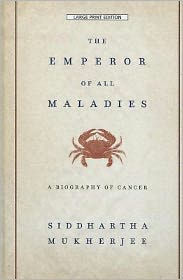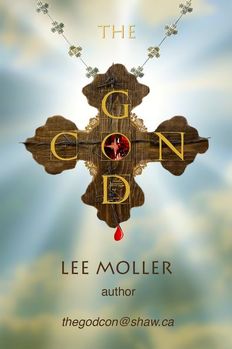Emperor of All Maladies, The; Siddhartha Mukherjee; 2010; Simon and Schuster; 470 pgs; Notes, index18/7/2017  There a few jobs I could never do, and being an oncologist is one of them. The ups are great, but the downs are deep. This Pulitzer Prize winner is excellently written and very interesting. Gripping even. The march of technology is really obvious, from the early ultra-extreme mastectomies on the early 20th century, to the use of genetics in the 21st. We live on knife edge. We all live in an apple skin think layer of gases that surround our planet. Deprive us of just a few breaths and we are dead. Rob us of liquid water and food, or vary the temperature a few degrees one way or another and we are dead again. Internally, we are an exquisitely balanced bag of chemicals immersed in a field of electricity that sports voltages that rival lightning. If nudged off kilter just a little, the result is death. Life itself relies on the death of cells (e.g.: your gut lining); the stasis of cells (e.g.: your brain) and the generation of new cells (in marrow, gut, gonads, breasts and so on). Controlling the death of cells is as important as controlling the birth of new ones, When the birth rates flies out of control, that is cancer. Despite the marches that imply that breast cancer has been largely ignored over time, the opposite is true. Breast cancer was the early great cancer battlefield, in part because you can live without breasts. It was amenable to surgery in the dark days, and is now often treatable. The hardest part of the book to read is the horrific practices of surgeons in the early 1900s. First they would take a lump, then a breast, then lymph nodes, muscles, and even bones to try and get ahead of the disease. And because they all relied on personal experience, they did not realize that disfiguring these women did not extend their lives at all. The big killer of women today is preventable lung cancer from smoking, followed by breast cancer. The book covers the history of cancer from Galen to today. The upshot is that cancer is many diseases; we will probably never beat it; we may be able to survive it; and most of the hope in the future will come from genetics and data processing. In one sense, cancer is a form of gambling by nature. Mutation is needed for evolution, as is death. Inaccurate reproduction is dangerous, but stuff like sex gives advantages. The down side is that if several random things happen at the same time, you get cancer. The upside is that the odds of all the necessary precursor events taking place is quite small. And that gamble is built in, so beating cancer is not really possible. DNA sequencing means that we might be able to beat it to a draw (which means you still get cancer, but live just as long as if you did not). And like in other sciences, research now is advancing at a dizzying speed compared to 100 years ago. The author blends personal stories with the grime history of the disease to create a compelling read.
0 Comments
Leave a Reply. |
AuthorLee Moller is a life-long skeptic and atheist and the author of The God Con. Archives
May 2024
Categories
All
|

 RSS Feed
RSS Feed